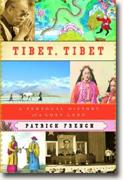Patrick French
book reviews:
· general fiction
· chick lit/romance
· sci-fi/fantasy
· graphic novels
· nonfiction
· audio books
· author interviews
· children's books @
curledupkids.com
· DVD reviews @
curledupdvd.com
newsletter
win books
buy online
links
home
for authors
& publishers
for reviewers

 |
Tibet, Tibet: A Personal History of a Lost Land Patrick French Knopf Hardcover 352 pages October 2003 |
|
Patrick French knows Tibet. He's lived there, worked as a political activist on behalf of its government in exile, and has, remarkably, been able to interview many of its current citizens, both in the country and out, both communist and Buddhist, and even those rare animals, the Buddhist communists.
French's Tibetan history begins and ends not with the Dalai Lama, whom he obviously reveres as a spiritual being, but with a man named Thubten Ngodup. Ngodup was a cook at a monastery guesthouse where French stayed in 1987. Ngodup had fled from the Communist invasion, served as a soldier in Indian, and was part of the Tibetan expatriate community in exile. Eleven years later, a tiny group of Tibetan refugees had been holding a demonstration in New Delhi at the United Nations, enduring a hunger strike. Ngodup was slated to be one of the next wave, to step in after someone died from hunger. But on a fateful day in April, a Chinese representative was scheduled to visit and police decided that the demonstrators had to be purged from its streets. Into the confusion, and caught on film rushes a man who has coated himself in cleaning fluids and set himself on fire. "Burning to death, holding his palms together in the Indian namaste greeting," Ngodup had made his choice. Shouting "Victory to Tibet" he is smothered in blankets. Dying slowly in hospital, he is visited by the Dalai Lama who urges him to feel no animosity toward the Chinese. According to a confidante, Ngodup had acted out the Tibetan "thak choego ray" - you have to make a decision and stick to it. He had decided to do something for Tibet. Mao Zedong regarded Tibet as an annoying outpost which he would control, using "fear and killing as political tools, the purging of close colleagues, the invention of imaginary traitors" as he had done so successfully in his homeland. There was never any real question as to the outcome of China's invasion in Tibet, although there was some doubt as to how the Tibetan religious leaders would react. His Holiness the Dalai Lama has publicly stated that he sees some strengths in the communist system and at first imagined there would be room for compromise with the conquerors, a tradition reaching far back in the history of this tiny and essentially defenseless nation. He told French, "I had enthusiasm that Tibet could transform itself under Communist leadership." But it quickly became obvious that there would be no accommodation possible, that Chinese would push too violently and too fast for any real reforms to be effected. Tenzin Gyatso, the Fourteenth Dalai Lama, fled to India and set up a government in exile, drawing towards him thousands of refugees and much tacit support from the West. The Tibet problem has perplexed us and brought forth political encouragement from the right (because anti-Communist) and the left (because anti-war) and the far far left (because of animal-rightist, vegetarian, peace-loving, chanting trappings of a pseudo-religion existing mainly in the minds of the beholders). Into this perplex French leaps, revisiting the real country in what can be called a richly laden, well-informed travelogue as well as a cultural and political history lesson. Towards the end of the book he debunks, if cordially, blind Dalaidolatry by seeking to challenge that great person, in person, with hard questions about the obfuscations of "official" Tibetan policy towards their conquerors, and the rather devious ways that Western supporters have been manipulated to favor Tenzin's claims to leadership of his lost land. In the end French has to conclude that "the Dalai Lama's inner life was transcendent, at the root of all he did, and that his heart was still firmly in the Potala. His spiritual practice and religious duties came before everything else." French sees in this a kind of redemptive hope - while remembering, too, the decision made by his friend Ngodup. © 2003 by Barbara Bamberger Scott for Curled Up With a Good Book |
|
|
|
 Click here to learn more about this month's sponsor! |
|
| fiction · sf/f · comic books · nonfiction · audio newsletter · free book contest · buy books online review index · links · · authors & publishers reviewers |
|
| site by ELBO Computing Resources, Inc. | |
 Most people thinking of Tibet think at once of the Dalai Lama, many sucked in to what the author calls "Dalaidolatry". Dalaidolatry is a body of vaguely pacifist beliefs aligned with what the general run of non-political liberal thinkers identify as the gentle, exotic face of Buddhism. Dalaidolatry does not take unto itself the demons and darkness of Tibetan religion, its devious, surprisingly worldly lamas and its long history of diplomatic compromise and conspiracy with the great dragon of China. French paints these into the picture.
Most people thinking of Tibet think at once of the Dalai Lama, many sucked in to what the author calls "Dalaidolatry". Dalaidolatry is a body of vaguely pacifist beliefs aligned with what the general run of non-political liberal thinkers identify as the gentle, exotic face of Buddhism. Dalaidolatry does not take unto itself the demons and darkness of Tibetan religion, its devious, surprisingly worldly lamas and its long history of diplomatic compromise and conspiracy with the great dragon of China. French paints these into the picture.